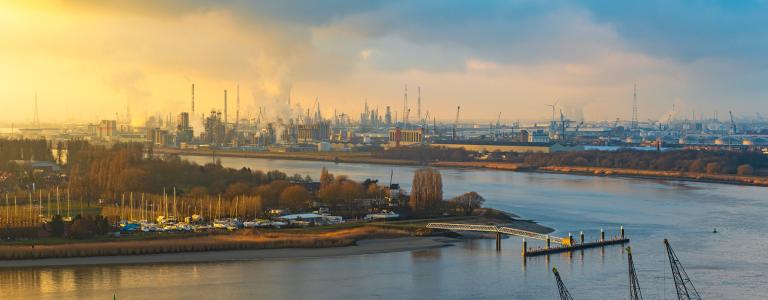Trade Solutions Are Needed to Tackle Climate Change Threat, WTO Says
The WTO’s new World Trade Report 2022: Climate Change and International Trade discusses how trade can be leveraged to create climate change adaptation strategies and accelerate a low-carbon economy transition, and greater international trade cooperation at the WTO is required for effective climate action.
Climate change is a “severe, pervasive, and potentially irreversible threat” to the world and, left unabated, could undo much of the progress made in recent years in development, poverty reduction, and prosperity creation, the World Trade Organization (WTO) says in a new report.
Developing countries—especially small island developing states and least developed countries—will likely be the biggest victims of a changing climate, the WTO says in its World Trade Report 2022: Climate Change and International Trade, issued today. That’s because they are more vulnerable to climate risks and natural disasters and less able to adapt to climate change, the 152-page report says.
“Leveraging trade to tackle climate change presents several development and growth opportunities and will require significant policy actions to advance a just transition toward a low-carbon, inclusive, and resilient future,” says the WTO’s flagship publication, launched as the 27th United Nations Climate Change Conference (COP 27) kicked off in Sharm el-Sheikh, Egypt.
The report makes three central points: First, while climate change can have profound negative impacts on international trade, trade and trade policies are essential elements of sound climate change adaptation strategies. Second, although trade itself generates greenhouse gas emissions from production and transport, trade and trade policies can accelerate the transition to a low-carbon economy by providing access to and spurring innovation in cutting-edge, low-carbon technologies, disseminating best practices and helping clean energy investments achieve the greatest reach at the lowest cost. Third, improving the ambition and effectiveness of climate action requires greater international trade cooperation at the WTO.
“Trade is instrumental for investments in clean energy to have the greatest reach and impacts, at lowest cost and where they are needed the most,” WTO Director-General Ngozi Okonjo-Iweala said in the report foreword. “These are returns we would be unwise to forego, especially now that the big green investment push we need will coincide with rising real costs of capital and looming uncertainty about energy security due to geopolitical tensions and war.”
Emissions Mitigation Policies Face Many Obstacles
Ambitious greenhouse gas mitigation policies face numerous challenges, including conflicting economic and development priorities, divergent energy strategies, and geopolitical competition, the report says. The fragile economic recovery from the COVID-19 pandemic, rising inflationary pressures, increasing food security challenges, and the war in Ukraine have added further uncertainties.
“While the transition to a low-carbon economy entails substantial short-term investment and adjustment costs, it will yield major economic dividends and create wide-ranging opportunities for more sustainable and fair development,” the report says. A well-managed low-carbon transition can limit climate risks, promote biodiversity, and improve food security, it adds.
The report also dismisses the “misleading assumption” that WTO rules prevent governments from adopting ambitious climate policies. It says that while the term “climate change” does not appear in WTO agreements, the trade body supports the fight against climate change by helping to ensure efficient and effective trade-related climate policies. While all climate change policies do not necessarily have a trade dimension, it says, WTO rules govern taxes, tariffs, support measures, regulatory measures, and other trade-related instruments that are relevant for implementing climate policies.
You might also be interested in
IISD Annual Report 2023–2024
While IISD's reputation as a convenor, a trusted thought leader, and a go-to source on key issues within the sustainable development field is stronger than ever, the work happening outside the spotlight is just as valuable.
Unlocking Supply Chains for Localizing Electric Vehicle Battery Production in India
This study aims to highlight the key supply chain barriers in localizing electric vehicle (EV) battery cell manufacturing in India. It summarizes consultations with 12 companies, as well as experts and policy-makers, to determine the crucial challenges and opportunities in localizing battery manufacturing in India.
The WTO and Fisheries Subsidies: Where are we, exactly?
What are the latest developments in WTO fisheries subsidies negotiations, focusing on marine conservation, community impact, and sustainable fishing practices? Tristan Irschlinger offers a comprehensive overview explaining key aspects of the agreement, ongoing discussions, and what’s at stake for global fishery sustainability.
COP 29 Must Deliver on Last Year’s Historic Energy Transition Pact
At COP 29 in Baku, countries must build on what was achieved at COP 28 and clarify what tripling renewables and transitioning away from fossil fuels means in practice.
